Prevention
Prevention
The intention to start the religious rites and at the same time perform any of the prescribed acts of worship of Hajj.
Entering into the state of Ihram is not realized except after making such a Niyya (intention); because from the moment he begins his journey from his country he has the intention of Hajj or ‘Umrah, and he does not enter into the state of Ihram just by discarding sewn clothes or making the Talbiyah without intending to start performing the rituals. The Prophet ﷺ said: “Actions are but by intentions, and each person will have that which he intended.” [ Source: Al-Bukhari.]
On the authority of Kharijah ibn Zaid ibn Tha’bit, on the authority of his father who said he saw the Prophet ﷺ “remove his clothes and take a bath before entering into ihram. ” [ Source: At-Tirmidhi.]

This is done by removing the armpit and pubic hair, and trimming the moustache and finger nails.


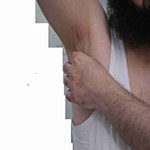
Aisha (may Allah be pleased with her) said; “I used to perfume the Messenger of Allah ﷺ for the purpose of Ihram at the time he intended it.” [ Agreed upon.]
But the Ihram clothes are not to be perfumed due to the statement of the Messenger ﷺ: “Do not put on clothes to which saffron or wars[ Al-Wars; a yellow plant with a pleasant smell, used for dyeing.] have been applied.” [ Agreed upon.]
 Perfume
PerfumeThis is due to the statement of the Prophet ﷺ: “Anyone of you who intends to perform Hajj or ‘Umrah should assume Ihram in a loin cloth and robe, and a pair of sandals. If he cannot find sandals, he should put on a pair of khuff (leather socks), but he must cut them to the ankles.” [ Source: Ahmad.]
As for a woman, she can assume Ihram with whatever clothes she prefers. There is no prescribed colour for her Ihram, but she must avoid resembling men and wearing adornments; and she is also not to wear the veil or gloves[ Gloves: Worn by women to cover their hands.] during Ihram.
But when she is in the presence of men who are strangers (non-Mahram), she must cover her face by pulling some of her clothes on the top of her head over her face. This was proven by the hadeeth that was narrated by Aisha when she said: “Riders would pass us while we were with the Messenger of Allah ﷺ and we were in the state of Ihram, and when they came close enough to us, we would draw our outer cloak from (the top of) our heads over our faces. When they had passed by, we would uncover our faces again.” [ Source: Abu Dawud.]
 Wearing sandals by a Muhrim"/> Wearing sandals by a Muhrim
Wearing sandals by a Muhrim"/> Wearing sandals by a Muhrim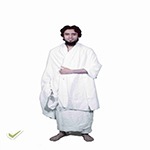 Wearing a loin cloth and robe by a Muhrim
Wearing a loin cloth and robe by a Muhrim  Face Veil worn by a female in Ihram
Face Veil worn by a female in Ihram Gloves worn by females in Ihram
Gloves worn by females in IhramThis is in accordance with the hadeeth of Ibn ‘Umar t that a man said: “O Messenger of Allah, what does a Muhrim wear?” The Messenger of Allah ﷺ answered: “Do not wear shirts, Turbans, trousers[ It is also known as bantaal (meaning: trousers).] or hooded cloaks[ Burnus (hooded cloak): every piece of cloth that has a hood joined to it.].” [ Agreed upon.]
And he ﷺ said concerning a Muhrim who had died: “Do not cover his head[ Do not cover his head (meaning): Do not place a cover (i.e. head cover) over him.] because he will be raised on the day of Resurrection saying the Talbiyah.” [ Source: Bukhari.]
However, if this covering were not to touch the head e.g. by using an umbrella (sun shade), tent, roof of a building or car, then there is no sin on him whatsoever.
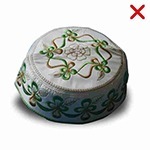 Wearing a cap by the Muhrim
Wearing a cap by the Muhrim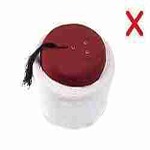 Wearing a turban by the Muhrim
Wearing a turban by the Muhrim Wearing of trousers by the Muhrim
Wearing of trousers by the Muhrim Sunshade for the Muhrim
Sunshade for the MuhrimWhat is meant by fitted garments: Any material sewn to fit the figure of the whole body or part of it, e.g. thobe, trousers, shirt, khuffs (leather socks), woollen socks, gloves, etc. This is due to the hadeeth of Ibn ‘Umar mentioned above, “Do not wear shirts, turbans, trousers, hooded cloaks or khuffs (leather socks).” [ Agreed upon.]
If the person intending Ihram does not find a loin cloth, then he can put on trousers until he finds one[ Eg. If a person forgets his Ihram attires in his travelling bag in the plane or ship, and does not have a loincloth with him, he should remove his clothes and assume Ihram in his trousers, and wrap his shirt around his body in the manner of a robe; he continues like this until he reaches the port and so finds his Ihram attire, which he should then put on as prescribed. The person commits no sin if he does this.]. Furthermore, if he does not have a pair of sandals he can put on khuffs (leather socks). This is in accordance with the statement of the Prophet ﷺ: “And if he cannot find sandals, he should put on khuffs (leather socks), but he must cut them to (be below) the ankles.” [ Ibn Khuzaimah.]
_for_the_Muhrim.jpg) Wearing khuffs (leather socks) for the Muhrim
Wearing khuffs (leather socks) for the Muhrim Wearing shoes
Wearing shoes Wearing a tailored garment
Wearing a tailored garmentThis is due to the Words of Allah the Exalted: “Kill not the game while you are in a state of Ihram for Hajj.” ( Al-Maidah: 95) i.e. you are in a state of Ihram for Hajj or ‘Umrah. And also His statement: “But forbidden is land game as long as you are in the state of Ihram.” (Al-Maidah: 96). What is meant by land game is every wild animal or bird that is permissible for consumption.
However, domestic animals are not regarded as game. Thus, it is permissible for the Muhrim to slaughter chickens, livestock etc. As for sea animals, they are permissible. This is due to the statement of Allah the Exalted: “Lawful to you is water game and its use for food.” (al-Mai’dah: 96).
As for animals that are forbidden to be eaten such as snakes, scorpions etc, their killing is permissible. It is permissible for the Muhrim to kill any animal that is harmful, if he cannot defend himself by other than killing it.
 Snake
Snake Scorpion
Scorpion Water game is permissible for the Muhrim.
Water game is permissible for the Muhrim. It is permissible to slaughter livestock during Ihram.
It is permissible to slaughter livestock during Ihram. Land game from among birds
Land game from among birdsAllah the Most High said: “And do not shave your heads until the Hady reaches the place of sacrifice.” (Al-Baqarah: 196).
This ruling is applicable to any hair on the body, being deduced analogically from the rule relating to the hair on the head.
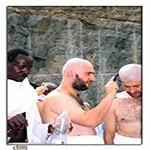 Shaving and trimming the hair
Shaving and trimming the hairBoth the fingers and toes nails.
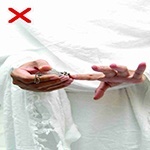 Clipping the finger nails
Clipping the finger nails 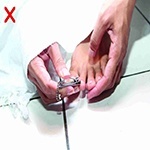 Clipping the toe nails
Clipping the toe nails It is forbidden for the Muhrim to perfume his body and clothes after assuming Ihram, or for him to deliberately smell it. This is due to the hadeeth by Ibn Umar t mentioned above: “... and do not put on any clothing touched with saffron and al-wars [ Al-Wars: A yellow, fragranced plant used in dyeing..]” [ Agreed upon.] and also due to the hadeeth about a Muhrim who had died and the Prophet ﷺ. said, “And do not use fragrant oils[ Tahannatuu: Usage of fragrant oils; that which is used to scent the shroud of a dead body.] on him.” [ Source: Bukhari.]
 A Muhrim perfuming his clothes
A Muhrim perfuming his clothes 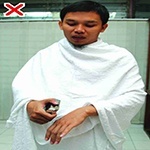 A Muhrim perfuming his body
A Muhrim perfuming his bodyThis is as elicited from the hadeeth of ‘Uthman t where the Messenger of Allah said: “A person in a state of Ihram must neither marry himself, nor arrange the marriage of another one, nor should he make the proposal of marriage.” [ Source: Muslim.]
It is the physical act of intercourse through the private part. This is according to the statement by Allah the Most High: “So whosoever intends to perform Hajj therein by assuming Ihram, then he should not have ar-rafath (sexual relations).” (al-Baqarah:197).
Ibn Abbas t said: It (ar-rafath) is sexual intercourse, and it is the gravest and it is the gravest of all prohibitions during Ihram.
For example kissing and caressing; as they are means leading to sexual intercourse, which is forbidden.
A woman is like a man with regards to the forbidden acts during Ihram, but differs in the following;
1- She wears tailored or fitted garments
2- She covers her head
3- She does not put on face veils[ Veil: What a woman uses to cover her face.] and gloves[ Al-Qafaaz (glove): That which is worn on the hands.]; this is as said by the Prophet ﷺ; “A woman assuming Ihram must neither wear the veil nor gloves.” [ Source: Bukhari.]
A woman covers her face while in the presence of strange men (non-mahram), not with the veil but by drawing the cloth from her head over it to cover it, and it is permissible for her to be adorned with gold.
1- There is no basis for what is called salatus-Sunah-rak’atayil Ihram (a two-rak’ah supererogatory salah at the instance of assuming Ihram), just as there is no particular supplication when assuming Ihram.
2- If a traveler is traveling by plane and fears he might not be able to put on the Ihram garment when he arrives at the meeqaat (the place where Ihram garment is worn), he should wear it from his home, or at the airport; but he does not become Muhrim by doing so until he makes the intention to perform the religious rites before nearing or reaching the meeqaat.
3- Some pilgrims bare their right shoulder, which is referred to as “Al-Idh’tiba’”, all the time they are wearing the Ihram garment, but this is incorrect. Al-Idhtiba’ is only done during the tawaaful qaduum (i.e the arrival or the first circumambulation). As for other than that, the Muhrim should cover his two shoulders.
 Al-Idhtibaa’
Al-Idhtibaa’When a Muslim decides to embark on a trip for Hajj or ‘Umrah, he should follow the following guidelines:
1- Advise his family and companions to fear Allah Almighty, which means to carry out His orders and avoid His prohibitions.
2- Write down the debts he owes to others and others owe him, and bring witnesses to witness this writing.
3- Hasten to repent sincerely from all sins. Repent to Allah, O believers, that you may prosper. Almighty Allah says: “O you who believe! Turn to Allah with sincere repentance!” (At-Tahreem: 8)
4- If he has wronged anyone with regards to their self, money or honor, he should make amends and give the rights back to their lawful owners before leaving, as it was authenticated that the Prophet (may the peace and blessing of Allah be upon him) said: “He who has done a wrong affecting his brother’s honor or anything else, let him ask his forgiveness today before the time (i.e., the Day of Resurrection) when he will have neither a Dinar nor a Dirham. If he has done some good deeds, a portion equal to his wrong doings will be subtracted from them; but if he has no good deeds, he will be burdened with the evil deeds of the one he had wronged in the same proportion.” [ Source: Bukhari.]
5- To only use the money which he has acquired in a permissible manner for spending on Hajj and ‘Umrah, for it was authenticated that the Prophet said: “Allah Almighty is Good and He accepts only that which is good, and verily Allah has commanded the believers to do that which He has commanded the Messengers (to do). Therefore Allah Almighty said: ‘O (you) Messengers! Eat of the tayyibat (all kinds of good and lawful (halal) foods), and perform righteous deeds.’ The Almighty has said: ‘O you who believe! Eat of the lawful things that We have provided you.’” Consequently he (may the peace and blessings of Allah be upon him) mentioned (the case) of a man who, having journeyed afar, was disheveled and dusty. Then he spread out his hands to the sky, saying ‘O Lord! O Lord!’ while his food was haram (unlawful), his drink was haram, his clothing was haram, and he had been nourished with haram, so how can (his supplication) be answered?” [ Source: Muslim.]
6- He has to intend by his Hajj and ‘Umrah the pleasure of Allah and the Hereafter and drawing closer to Allah with what pleases Him of words and actions in those noble places. He also has to be especially careful not to spoil his Hajj with the aim of gaining the worldly things from the trip or by showing off and bragging.
7- He should learn what has been prescribed for him to be done in his Hajj and ‘Umrah and to comprehend everything related to that, and ask about what confuses him to be sure about everything. Unfortunately, many of the Hojjaj (pilgrims) go to Hajj without having learned how to perform Hajj. They, therefore, miss performing some of its obligatory actions etc., which might, thereby, even invalidate their Hajj.
If hairs fall from the head of a Muhrim during ablution or during bathing due to wiping (or scrubbing), this does not harm him (and there is no sin involved), neither does the loss of hairs from his moustache, beard, or any part of the nails falling off involve any sin, as long as all these are not intentional. This is applicable to men as well as women. It does not affect either of them. It is permissible for a Muhrim to tie a (string, ribbon or cord) on his leg, if he needs that or he may benefit from its use.
- Making Conditional Intention …
Whosoever has an ailment or fears that something may happen which might hinder him from completing the Hajj rites, it is recommended for him to state a condition when entering the state of Ihram, by saying: “O Allah I answered your call for ‘Umrah (or the like), but if anything hinders me from completing it, then the place of my release (i.e. disengagement from the Hajj/‘Umrah rites) is the place where I am hindered.” On the authority of ‘Aisha (may Allah be pleased with her); The Prophet entered upon Dhuba’ah bint Zubayr and said to her: “It seems you want to perform Hajj?” She said: “By Allah, I do not see anything preventing me except for a “waji’atan” (pain).[ Waji’atun: Ailment.]” He ﷺ then said: “Perform Hajj and be conditional (in your intention) by saying: ‘O Allah, my place (of being released, i.e. disengagement from Hajj rites) is wherever I am hindered.’” [ Agreed upon.] When this is said and anything restrains him, then it is permissible for him to be free of the Hajj rites and he does not have to compensate with anything for not completing them.